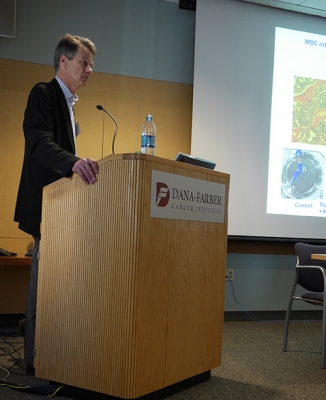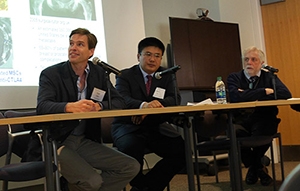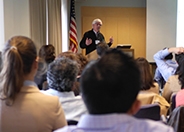 “Mesenchymal stem cells are like sushi,” Jacques Galipeau, MD, told an audience of the world’s premiere MSC researchers, clinicians, and bioengineers in his keynote address at Harvard Stem Cell Institute’s (HSCI) Mesenchymal Stem Cell Colloquium. “Fresh is best.”
“Mesenchymal stem cells are like sushi,” Jacques Galipeau, MD, told an audience of the world’s premiere MSC researchers, clinicians, and bioengineers in his keynote address at Harvard Stem Cell Institute’s (HSCI) Mesenchymal Stem Cell Colloquium. “Fresh is best.”
Mesenchymal stem cells (MSCs) have become a popular tool used to advance cell therapies to the clinic — at present, more than 600 studies registered in the U.S. National Institutes of Health’s clinical trials database involve MSCs; however, few trials have succeeded and many scientists remain skeptical of the efficacy of MSCs. Both skeptics and advocates were encouraged to discuss openly and candidly the advancements and challenges of using MSCs for therapeutics.
Galipeau, a clinical hematologist and a professor at Emory University, started the day-long conference by reviewing the state of the field and the state of clinical trials. MSCs, Galipeau said, are an attractive cell therapy because not only can scientists generate therapeutic quantities of autologous MSCs from a 20cc sample of bone marrow within a week’s time, but they also have shown MSCs to be beneficial in mouse studies. That success, however, has not translated to human clinical trials, a fact that did not surprise Galipeau considering the stark differences in protocols between mouse and human studies; mouse MSC samples are almost always homologous and fresh while human samples are often allogeneic and old (hence Galipeau’s “fresh is best” maxim).
Various panelists throughout the day highlighted some of the challenges facing MSC research.
“Patients that we group according to clinical symptoms really may be biologically very different,” said Katarina Le Blanc, MD, PhD, from Karolinska Institutet, who spoke during a “Lessons from Clinical Trials” panel. Le Blanc’s research uses MSCs to treat graft versus host disease. Should MSC therapies work on some biological mechanisms in some people but not others, that information may often be lost in a pooled data set.
There is a widening gap between academic and commercial enterprises in regards to the clinical trial process, said Arnold Caplan, PhD, from Case Western University, who coined the term mesenchymal stem cell in 1991 and is considered a founder of the field. “The whole value system of running a clinical trial and being judged against standard of care, which is a pharmacological concept, is completely illogical.”
During the “Technology to Create the Next Generation of MSCs,” Kelvin Ng, PhD, from the Harvard-MIT Division of Health Sciences and Technology, discussed the value of extracellular vesicles, the “mini-cells” that are the principal mechanism of action in MSC therapies, and their challenges, such as the variability among them. No two extracellular vesicles are the same, Ng said; some have a single membrane while others have multiple membranes, some contain RNA while others load DNA, and every extracellular vesicle contains a unique set of molecules. “What we have in extracellular vesicle prep is a very heterogeneous population,” Ng said, and the heterogeneity in the mechanism may account for the variability seen in MSC therapy results.
Additionally, heterogeneity between labs and protocols, the placebo effect, and poor clinical design, (“being the first is always the most challenging”) make it “virtually impossible to achieve efficacy” in a clinical trial, said HSCI Principal Faculty member Jeffrey Karp, PhD, from Brigham and Women’s Hospital. Karp proposed that a new approach—namely bioengineering—could help researchers control cell location as well as the secretome.

“Fresh is best, fit is fine, but bioengineered is better,” Karp said, amending Galipeau’s earlier catchphrase.
However, others in attendance posed that bioengineering could actually create more challenges for the field. HSCI Principal Faculty member Chad Cowan, PhD, from Harvard University, pointed out that bioengineering may improve MSCs and make them last longer, but it could give them more time to have a deleterious effect.

David Scadden, MD, Co-Director of HSCI, wrapped up the day with a reminder of how much work lies ahead. “Knowing more about the cell populations and what they do in the body,” Scadden said, “may lead us to more guided therapies.”
